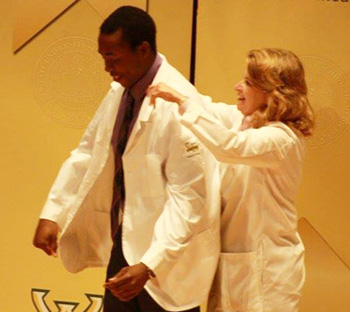
Lucia Luna Wong spent her childhood in the Peruvian Amazon entrenched in biology and engrossed by science. She collected and studied animals as a hobby, and decided at 17 years old that she would be a doctor. But when she looked around her country, she often saw the doctors on strike, and decided human medicine wasn't necessarily for her. Yet.
At 21, Luna Wong, then a struggling thrift store-shopping college student in Lima earning 50 cents for each tour she gave at the university's Natural History Museum, met an American scientist and research associate from the Smithsonian Institute named Louise Emmons, Ph.D. Emmons was teaching conservation and surveying in Lima. Luna Wong was the youngest one accepted to the program, and helped record a new mouse and new marsupial for the country.
"We were giving field courses, and she was the best student," Emmons said. "I told her to learn English and come get a Ph.D."
So she did. Luna Wong, now a United States citizen, earned a master's degree in Illinois, then a doctorate in Evolutionary Biology from the University of Michigan.
Now, determined to explore the connection between animals and humans, specifically their dual role in the spread of emergent diseases like Ebola, Zika and HIV, she has revisited the dream of her 17 year old self. At the Wayne State University School of Medicine's annual White Coat Ceremony on July 29, she received an important physical symbol of her chosen path - a short white coat emblazoned with a WSU School of Medicine patch, indicating that she and her 286 colleagues are now medical students.
"Welcome Class of 2020. Many of you were accepted at other medical schools, and you chose to come to Wayne State, and Detroit," said School of Medicine Dean and Distinguished Professor Jack D. Sobel, M.D. "This choice of yours shows your willingness and passion to help and service the population of Detroit. I wish you fulfillment and continued passion."
The ceremony, inside Orchestra Hall adjacent to the Max M. Fisher Music Center in Detroit, capped a week's worth of orientation activities. "It was a good welcome to the medical school," said Joseph Brazier, who will start classes Monday with his twin brother Allan and college friend David Clausen.
The trio met on the first day of undergraduate classes at WSU. And, while Joseph knew at 8 years old that he wanted to be a doctor, inspired by his physician uncle, his younger brother by six minutes "took a little longer," Allan said.
For their new colleague, Ayo Ayoola, her mind was made up before she finished middle school. The then-seventh grader, a native of Nigeria, was inspired by medical students and medical residents she met at a day camp at Michigan State University. "I wanted to be like them some day," she said. "I'm proud to be here."
Ayo's mom, Adejoke Ayoola, moved the family to Michigan while pursuing her doctorate in nursing. She, husband Bernard, daughter Ife, 10, and Ayo's boyfriend Kwesi Asare all attended the White Coat Ceremony Friday to support Ayo, joining hundreds of other families and friends who packed the auditorium in support of the Class of 2020.
Associate Dean for Admissions Kevin Sprague, M.D., '80, read each student's name as they took the orchestra stage while Vice Dean for Medical Education Richard Baker, M.D., Assistant Dean for Student Affairs and Career Development Lisa MacLean, M.D., or a physician parent, grandparent, aunt or uncle, sibling or mentor, cloaked them in the hip-length white coat.
The White Coat Ceremony is an international tradition started by the Arnold P. Gold Foundation in 1993 to remind incoming medical students to practice humanistic patient-centered medical care. "It is a personally-delivered gift of faith, honor and compassion," said Elisabeth Heath, M.D., faculty advisor to WSU's Gold Humanism Honor Society chapter.
Keynote speaker and Nephrologist Noreen Rossi, M.D., implored them to evoke Dr. Heath's sentiments throughout their careers, putting patients and their families first.
"What is their greatest fear? Are they afraid of being sick? Yes, of course. You will have the opportunity, and the potential, to make that feeling go away," she said.
Dr. Rossi, a professor of Physiology and program director of the Fellowship of Nephrology, received the Leonard Tow Humanism in Medicine Award in March from the Class of 2016. Two weeks ago, she saw the middle-aged daughter of a former patient she cared for decades ago, a woman who died from Lupus at 39 years old. The daughter recognized Dr. Rossi immediately as the physician who talked to her about her mother's end-of-life wishes and was there when her mother passed away, the family gathered at the foot of her bed.
"Even when we cannot cure, physicians will be there. We will be there. And we will remember it," she said.
Classes begin Aug. 1.